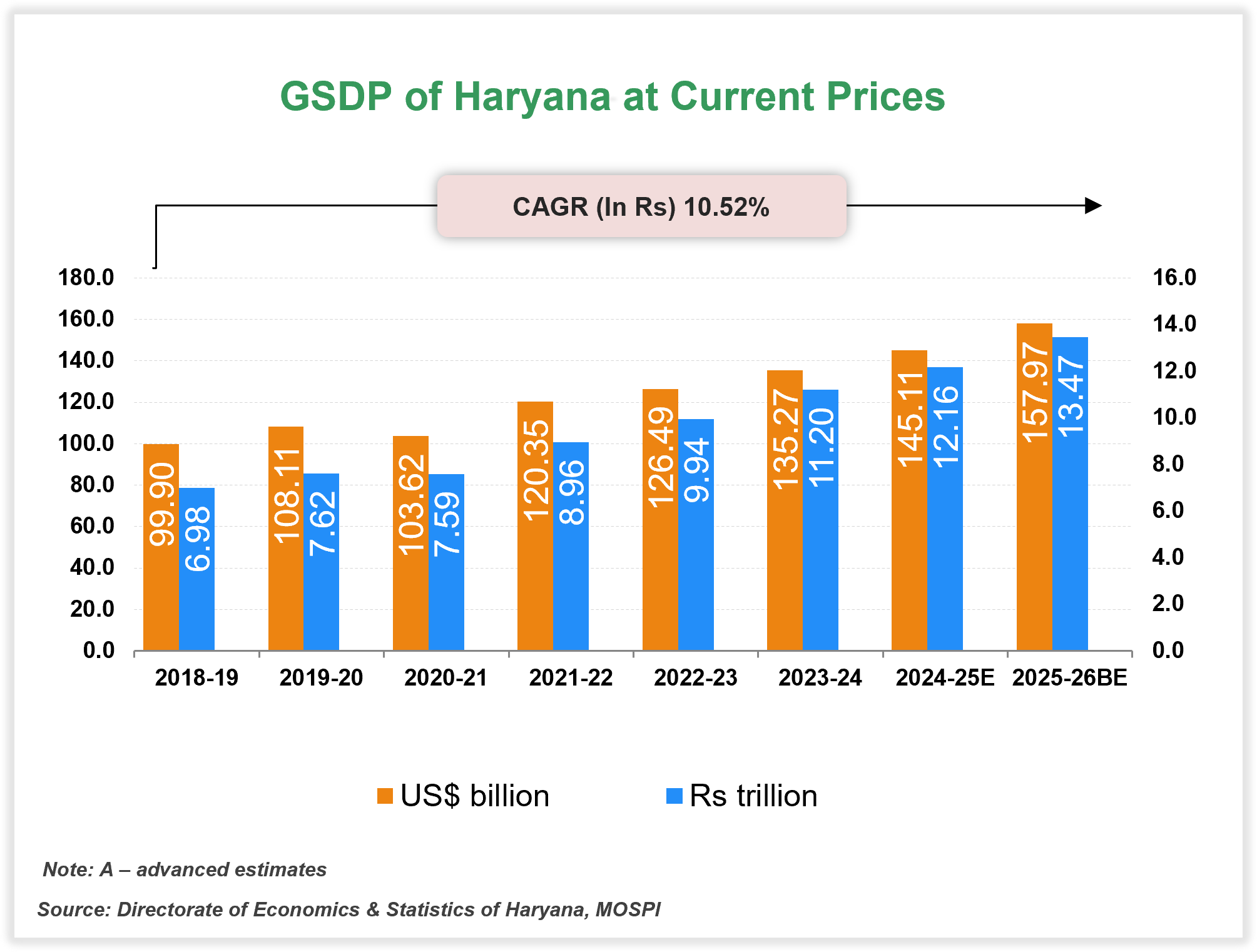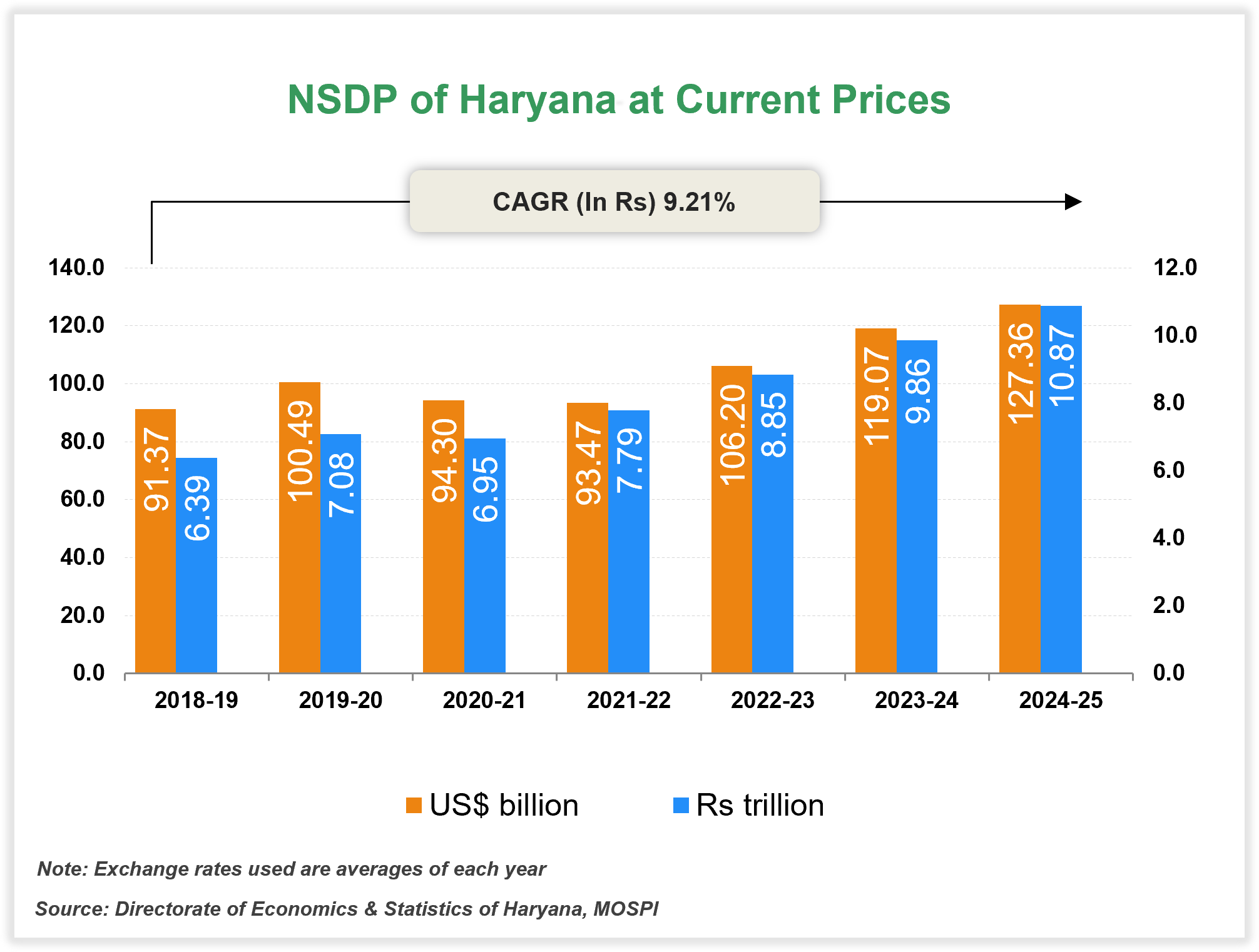Haryana
Haryana is the third-largest exporter of software and one of the preferred destinations for IT/ITeS facilities in India.


Haryana is one of the leading states in terms of industrial production, especially passenger cars, two-wheelers, mobile cranes, and tractors. Haryana is the second-largest contributor of food grains to India’s central pool and accounts for more than 60% of the export of Basmati rice in the country, the third-largest exporter of software and one of the preferred destinations for IT/ITeS facilities.
The Gross State Domestic Product (GSDP) of Haryana for 2025-26 (at current prices) is projected to be Rs. 13,47,486 crore (US$ 157.97 billion). The state’s GSDP (in Rs.) expanded at a CAGR of 10.52% between 2015-16 and 2025-26.
According to the Department for Promotion of Industry and Internal Trade (DPIIT), cumulative Foreign Direct Investment (FDI) inflows in Haryana stood at Rs. 1,23,329 crore (US$ 13.9 billion) between October 2019-June 2025.
Haryana is a preferred destination for auto majors and auto-component manufacturers. The state is host to many large automotive players. The state produces two-thirds of passenger cars, 50% of tractors, 60% of motorcycles and 50% of the refrigerators manufactured in the country.
As of September 2025, Haryana had a total installed power generation capacity of 14,462 MW, comprising 7,696.65 MW under private utilities, 2,929.30 MW (state utilities) and 3,836.96 MW (central utilities).
The state offers a wide range of fiscal and policy incentives for businesses under the Industrial and Investment Policy, of 2011. Moreover, it has sector-specific policies, particularly for IT and tourism. The Haryana State Industrial and Infrastructure Development Corporation Ltd (HSIIDC) is the state's premier industrial promotion and investment facilitation agency, responsible for providing reliable and efficient facilities for entrepreneurs investing in the state.
The state has taken several steps to develop industrial infrastructure to achieve consistent economic growth, below are some of the initiatives:
- Haryana’s automobile sector is set to gain from the recent GST rate cuts. The Gurugram-Manesar-Bawal auto belt, home to Maruti Suzuki, Hero MotoCorp, Escorts and Tata Motors, will benefit from the 28% to 18% reduction on vehicles and parts, improving affordability, sales and job creation.
- Haryana plans a Rs. 1,848 crore (US$ 208 million) infrastructure investment for industrial zones in FY26 to strengthen its bid to become a manufacturing hub. The budget for the Department of Industry and Commerce has been raised by 129% to support roads, connectivity and new incubation centres across the state.
- Under the Smart City Mission, Haryana is developing Faridabad and Karnal with equal funding from the Centre and the State. Faridabad has received Rs. 980 crore (US$ 110 million) for 45 projects, with 32 completed and 10 in progress. Karnal has been allocated Rs. 906 crore (US$ 102 million) for 121 projects, with 77 completed and 10 ongoing. Both cities are advancing Area-Based and Pan-City initiatives to enhance urban infrastructure and service delivery.
- On November 8, 2025, Haryana’s Special High Powered Purchase Committee approved key rate contracts to enhance healthcare services, including procurement of 87 defibrillators worth Rs. 4.64 crore (US$ 523,229), 40 mobile X-ray machines worth Rs. 1.01 crore (US$ 113,892), GI endoscopy systems worth Rs. 7.20 crore (US$ 811,907), and Rs. 60 crore (US$ 6.8 million) for essential drugs. The panel also cleared Rs. 26.2 crore (US$ 3 million) for appointing a service provider to operate 30 Urban Ayushman Arogya Mandirs in Gurugram.
- In the budget 2025-26:
- Haryana has allocated 12.9% of its expenditure on education in 2025-26.
- Haryana has allocated 5.9% of its expenditure on health in 2025-26.
- Haryana has allocated 4.5% of its expenditure on rural development in 2025-26.
- Haryana has allocated 2.3% of its expenditure on roads and bridges in 2025-26.
- Agriculture: Haryana has allocated 5.4% of its expenditure on agriculture in 2025-26.
- Urban Development: Haryana has allocated 3.8% of its expenditure on urban development in 2025-26.
- In November 2024, the state government approved the detailed project report for the Haryana Clean Air Project for Sustainable Development and is being funded by the World Bank, which aims to combat pollution and promote sustainable growth across the state. The project will be implemented over six years, with Rs. 3,600 crore (US$ 422 million) allocated for its first phase. Of this, nearly Rs 1,100 crore (US$ 129 million) was allocated to the transport sector to strengthen public transportation and curb emissions across the state.
- In March 2025, Automobile manufacturer Maruti Suzuki India Limited announced that it will invest Rs. 7,410 crore (US$ 864 million) to set up a third manufacturing plant at Kharkhoda in Haryana.
- In March 2025, the Haryana government announced that it has decided to extend the Atma Nirbhar Textile Policy 2022-25 along with its subsequent schemes by one year till December 18, 2026. Additionally, the government has decided to remove the cap on the number of cases under the Capital Investment Subsidy for Textile Units scheme as part of the policy.
- In April 2024, DLF has commenced construction of a new shopping mall in Gurugram, spanning 26-27 lakh square feet, with an investment of approximately US$ 263.8 million (Rs. 2,200 crore). This project is part of its expansion strategy in response to the resurgence in retail consumption following the COVID-19 pandemic.
- In April 2024, Uno Minda started building a new passenger vehicle alloy-wheel plant in IMT Kharkhoda, Haryana, with an investment of US$ 65.1 million (Rs. 542 crore). The facility will produce 1.2 lakh wheels per month.
- Haryana is among the states having ~100% connectivity to rural areas with metalled roads. Haryana Roadways, with its fleet of ~3,651 buses, is one of India’s biggest state road transport undertakings. It operates ~10.67 lakh km every day, carrying an average of 9.49 lakh passengers daily.
- Haryana ranked first at the national level by the Ministry of Health and Family Welfare (MoHFW) to earn a bonus of Rs. 71.72 crore (US$ 10.17 million) for performing outstanding services in the healthcare sector.
- Under its ‘Horticulture Vision’, the state government aims to double the area under horticulture from 7.5% to 15% and triple horticulture production by 2030. The state government has also notified the Haryana Agri-Business and Food Processing Policy 2018.
- Single-window clearance mechanism was established under the Haryana Industrial Promotion Act, of 2005. It has a three-tier structure to grant exemption/relaxation from any of the provisions/rules of the Act.
- The state invested in the development of world-class infrastructure facilities such as special economic zones (SEZs), Kundli-Manesar-Palwal (KMP) global corridor and the Delhi-Mumbai Industrial Corridor (DMIC).
- As of April 2025, the state had 22 Special Economic Zones (SEZs).
- Haryana is the first state to have implemented its Statewide Area Network (SWAN) for voice, data, and video transmission.
- The State Government has established a Regional Centre for Biotechnology (RCB), Gurgaon under the guidance of UNESCO as a Category II Centre.
Haryana is a strategically located, highly industrialised state surrounding the national capital and serving as one of India’s key manufacturing and services hubs. With a projected GSDP of US$ 157.97 billion in 2025-26 and strong long-term growth, the state has emerged as a major centre for automobiles, textiles, IT/ITeS and agri-based industries. Its investor-friendly policies, extensive industrial infrastructure, large SEZ base, robust power capacity and skilled workforce support sustained industrial expansion. Rising FDI inflows, logistics upgrades, clean air and urban infrastructure initiatives, and targeted budgetary support for education, health, agriculture and rural development continue to strengthen Haryana’s competitiveness and position it as a preferred destination for manufacturing, exports and technology-led growth.




